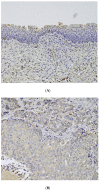Expression of Membranous CD155 Is Associated with Aggressive Phenotypes and a Poor Prognosis in Patients with Bladder Cancer
- PMID: 35326727
- PMCID: PMC8946612
- DOI: 10.3390/cancers14061576
Expression of Membranous CD155 Is Associated with Aggressive Phenotypes and a Poor Prognosis in Patients with Bladder Cancer
Abstract
Objective: To investigate the relationship between clinicopathological findings and membranous CD155 (mCD155) or cytoplasmic CD155 (cCD155) expression in bladder cancer (BC). Methods: We retrospectively analyzed 103 patients with BC who underwent radical cystectomy between 1990 to 2015 at Kitasato University Hospital. Immunohistochemical staining was performed to evaluate CD155 expression in tumor cells. Cases with > 10% expression on the membrane or cytoplasm of tumor cells were positive. The Fisher′s exact test was used for categorical variables and the Kaplan−Meier method was used for survival outcomes. Univariate and multivariate Cox regression hazard models were used to evaluate the survival risk factors. Results: Cases that were mCD155-positive were associated with high-grade tumors (p = 0.02), nodal status (p < 0.01), and pT stage (p = 0.04). No association with any clinicopathological factor was observed in the cCD155 cases. Kaplan−Meier analysis showed that mCD155-positive cases had shorter periods of recurrence-free survival (p = 0.015) and cancer-specific survival (p = 0.005). Only nodal status was an independent predictor for both cancer-specific survival and recurrence-free survival in multivariate analysis (p = 0.02 and p < 0.01, respectively). Conclusion: mCD155 expression may be a marker of an aggressive phenotype and a poor prognosis in patients with BC.
Keywords: CD155; bladder cancer; cystectomy; immunohistochemistry; poliovirus receptor; urothelial carcinoma.
Conflict of interest statement
The authors declare no conflict of interest.
Figures




Similar articles
-
Poliovirus receptor CD155 is up-regulated in muscle-invasive bladder cancer and predicts poor prognosis.Urol Oncol. 2020 Feb;38(2):41.e11-41.e18. doi: 10.1016/j.urolonc.2019.07.006. Epub 2019 Aug 2. Urol Oncol. 2020. PMID: 31383549
-
PD-L1 expression in tumor-infiltrating lymphocytes (TILs) as an independent predictor of prognosis in patients with pN0 bladder cancer undergoing radical cystectomy.Urol Oncol. 2021 Mar;39(3):195.e15-195.e23. doi: 10.1016/j.urolonc.2020.09.034. Epub 2020 Oct 16. Urol Oncol. 2021. PMID: 33071109
-
Membranous Expression of Heart Development Protein with EGF-like Domain 1 Is Associated with a Good Prognosis in Patients with Bladder Cancer.Diagnostics (Basel). 2023 Sep 27;13(19):3067. doi: 10.3390/diagnostics13193067. Diagnostics (Basel). 2023. PMID: 37835810 Free PMC article.
-
Nuclear E-cadherin expression is associated with the loss of membranous E-cadherin, plasmacytoid differentiation and reduced overall survival in urothelial carcinoma of the bladder.Ann Surg Oncol. 2013 Jul;20(7):2440-5. doi: 10.1245/s10434-012-2709-4. Epub 2012 Oct 30. Ann Surg Oncol. 2013. PMID: 23108554
-
CD155 immunohistochemical expression in upper tract urothelial carcinoma predicts poor prognosis.Oncol Lett. 2022 Sep 28;24(5):414. doi: 10.3892/ol.2022.13534. eCollection 2022 Nov. Oncol Lett. 2022. PMID: 36245820 Free PMC article.
Cited by
-
The Nectin family ligands, PVRL2 and PVR, in cancer immunology and immunotherapy.Front Immunol. 2024 Aug 2;15:1441730. doi: 10.3389/fimmu.2024.1441730. eCollection 2024. Front Immunol. 2024. PMID: 39156900 Free PMC article. Review.
-
Insights into Urologic Cancer.Cancers (Basel). 2023 Jun 8;15(12):3108. doi: 10.3390/cancers15123108. Cancers (Basel). 2023. PMID: 37370718 Free PMC article.
-
Upregulation of the CD155-CD226 Axis Is Associated With Muscle Inflammation and Disease Severity in Idiopathic Inflammatory Myopathies.Neurol Neuroimmunol Neuroinflamm. 2023 Jul 25;10(5):e200143. doi: 10.1212/NXI.0000000000200143. Print 2023 Sep. Neurol Neuroimmunol Neuroinflamm. 2023. PMID: 37491355 Free PMC article.
-
Receptors and Host Factors for Enterovirus Infection: Implications for Cancer Therapy.Cancers (Basel). 2024 Sep 12;16(18):3139. doi: 10.3390/cancers16183139. Cancers (Basel). 2024. PMID: 39335111 Free PMC article. Review.
References
-
- Matsumoto K., Tabata K., Hirayama T., Shimura S., Nishi M., Fujita T., Iwamura M. Robot-assisted laparoscopic radical cystectomy is a safe and effective procedure for patients with bladder cancer compared to laparoscopic and open surgery: Perioperative outcomes of a single-center experience. Asian J. Surg. 2019;42:189–196. doi: 10.1016/j.asjsur.2017.11.002. - DOI - PubMed
-
- Xylinas E., Cha E.K., Sun M., Rink M., Trinh Q.D., Novara G., Green D.A., Pycha A., Fradet Y., Daneshmand S., et al. Risk stratification of pT1-3N0 patients after radical cystectomy for adjuvant chemotherapy counselling. Br. J. Cancer. 2012;107:1826–1832. doi: 10.1038/bjc.2012.464. - DOI - PMC - PubMed
-
- Oughton J.B., Poad H., Twiddy M., Collinson M., Hiley V., Gordon K., Jhonson M., Jain S., Noon A.P., Chahal R., et al. Radical cystectomy (bladder removal) against intravesical BCG immunotherapy for high-risk non-muscle invasive bladder cancer (BRAVO): A protocol for a randomised controlled feasibility study. BMJ Open. 2017;7:e017913. doi: 10.1136/bmjopen-2017-017913. - DOI - PMC - PubMed
LinkOut - more resources
Full Text Sources
Research Materials

